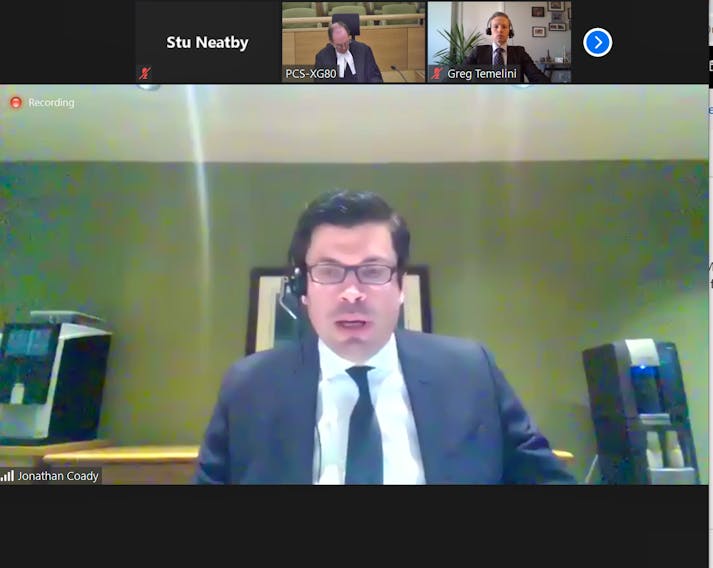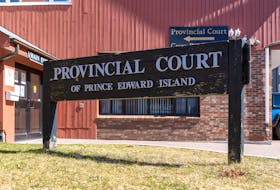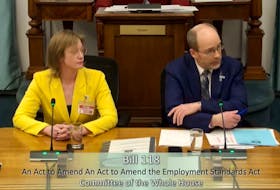Counsel for defendants named in a $150-million lawsuit, related to the P.E.I. government’s failed e-gaming initiative, variously described the lawsuit as “outrageous,” as “noise,” and as having “no merit” during an appeal hearing on Wednesday.
Wednesday’s hearing related to the appeal of a 2019 decision by Supreme Court Justice Gordon Campbell, which dismissed the lawsuit brought about by Capital Markets Technology Inc. against the P.E.I. government and 14 other defendants. This was the second time Campbell had dismissed a lawsuit brought about by CMT against the provincial government.
Jonathan Coady, counsel representing the provincial government and nine of the defendants, referred to Campbell’s lengthy decision several times in his submissions.
Coady referred to The Signal and the Noise, a book by American statistician Nate Silver. Coady said the book’s title refers to signals, which refers to truth, and noise, which refers to distractions.
"In a court of law, we have to focus on the signals, the admissable evidence,” Coady said.
“When we do that in this case, it is my submission there is no reviewable error and this does not raise any genuine issues that require trial."
In his decision, Campbell stated counsel for CMT had not produced an affidavit from Gary Jessop, a lawyer and director of CMT. Jessop was a signatory to a 2012 memorandum of understanding between Innovation P.E.I. and CMT.
A central claim of the CMT lawsuit is that the MOU was breached by several government officials and others.
Coady referred to the lack of affidavits from Jessop in the CMT filings.
Coady also disputed an accusation by John W. McDonald, counsel for CMT, accusing former premier Robert Ghiz of deliberately deleting emails of other government officials, including his former chief of staff Chris LeClair.
Coady said a form signed by Ghiz, which authorized the deletion LeClair’s email account, was a standard practice for all former civil servants once they left office. He also said the account was deleted in 2011, before the MOU was signed.
"So the action that he took was before the MOU was even a glimmer in anyone's eye?" asked Court of Appeal Justice David Jenkins.
"That's correct," Coady said.
“(The allegations are) not only without merit. They’re hurtful."
NOT AN EMPLOYEE
Leigh Youd, counsel for lawyer Gary Scales, who was retained by the Mi’kmaq Confederacy of P.E.I. related to the e-gaming initiative, said Scales was not an employee of the provincial government during the time period in question.
He also said Scales knew nothing about the MOU agreement when it was signed.
Youd called the allegations made in the lawsuit “outrageous.”
Gavin Tighe, counsel for William Dow, a lawyer who formerly represented Innovation P.E.I. and Tracey Cutcliffe, a former government relations specialist, made similar statements.
Tighe also said case law has established that the tort of misfeasance can only be levelled against public officers and that their conduct must be proven to both be wrongful and to have harmed the plaintiff.
Tighe said the evidence did not establish this.
“The unrefuted evidence from both Cutcliffe and Dow is that neither one of them were elected officials,” Tighe said.
“They’re not only without merit. They’re hurtful,” Tighe said of the allegations.
STRANGE CLAIM
Greg Temelini, counsel representing defendant Steven Dowling, said his client had pursued a securities investigation into CMT’s activities in the fall of 2012. Dowling is a director with the Department of Justice and Public Safety. The 2012 investigation resulted in a settlement in which CMT admitted to improperly selling securities.
Temelini argued that the accusation of misfeasance of public office was a strange claim to make of Dowling, due to the admission of wrongdoing by CMT.
“This isn’t a parking ticket. It demeans the office of the superintendent of securities to say otherwise,” Temelini said.
In response, CMT's counsel argued that the evidence he has presented raised issues of accountability of government officials. McDonald had argued on Tuesday that government counsel had withheld key documents and internal communications of several government officials involved in the e-gaming initiative, and of their dealings with CMT in relation to the initiative.
“If there’s a common theme here, it’s documents. What happened to them? Where are they?” McDonald said.
“What about these concepts of accountability, transparency, integrity?”
A decision on the appeal is expected in the coming months.









